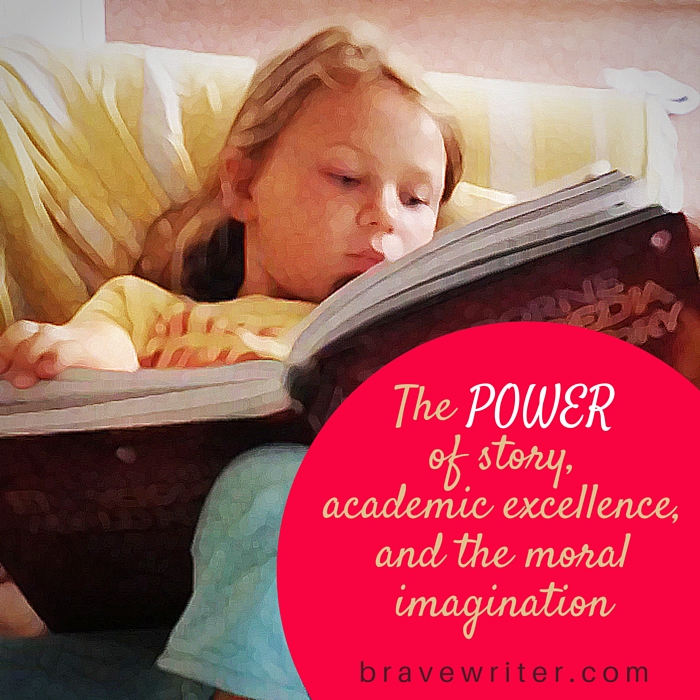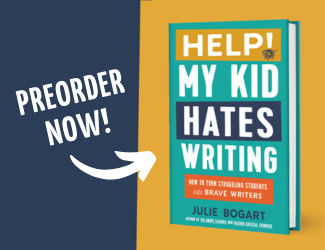The Power of Story
We read aloud to our children each day, fulfilling this basic “requirement” that our kids get an education from quality literature often not aware of how deep that education goes just from reading Redwall (again) or The Wind in the Willows. I don’t know if we (as a group) have plumbed the depths of how powerful all that reading is. In fact, I daresay that we mostly have not!
How many of us have associated the pleasure of Trumpet of the Swan with furnishing academic brilliance?
Yet this is precisely what is happening in living rooms strewn with Legos across the country (and globe). Home educators are doing a greater service for their children and the aims of education through the simple practice of immersing themselves in story each day than any other single practice.
You’re providing the education academics DREAM of providing.
Did you know that STORY is the foundation of a quality liberal arts education?
Rudyard Kipling says:
“If history were taught in the form of stories,
it would never be forgotten.”
Story as Education
Narratives, tales, myths, legends, fictions–the ability to see the story
in any subject area is the heart of a sophisticated, multi-faceted education.
Here’s why.
Academics like to talk a lot about the “imagination”–the capacity to imagine oneself into other times and places, cultures and worldviews, value sets and moral dilemmas.
Your child’s academic imagination grows
in direct relation to immersion in story.
Reading aloud, reading fiction, reading poetry, reading biographies, reading non-fiction, reading religious texts: Reading leads to a robust exploration of what it means to be human, sharing a planet.
Story also comes from other sources: film, video games, plays, documentaries, lectures, sermons, artwork, music, and television.
What homeschoolers do better than any other educational tool is plunge their children into the heart of STORY, every day:
narrative,
plot,
characters,
perspectives,
experiences,
moral dilemmas,
enriching cultural detail,
other times, other places, other worlds!
You’re great at it!
As we give our children this gift of STORY from the rocking chair or cuddled on a couch, we create connections in our children’s minds that resurface again and again. Charlotte Mason calls these connections: “The Science of Relations.” In Brave Writer, we call them: “Powerful Associations.”
Modern day stories that make use of ancient mythology are resonant for active readers (Percy Jackson books, Harry Potter, Hunger Games). Historical fiction shows us the world before we arrived and gives us context for our every day experiences (Johnny Tremain, The Master Puppeteer, The Bronze Bow).
Cross-cultural exploration through story shrinks the globe
and creates empathic ties to people who are different from us.
One of my favorite professors (40+ years as a professor, Harvard Ph.D.) said to me last week that what’s missing in too many of today’s in-coming college freshmen is the capacity to imagine richly–with texture, openness, and connection between subjects. Reading and writing in the humanities, in particular, depend on a complex intuitive understanding of the narrative arc:
what creates surprise,
the nature of viewpoint,
power dynamics,
moral right and wrong as they are funneled through lived experiences and confronted by characters/actors through dilemmas,
the underlying mythology of the narrative.
Moral Imagination
One of the core curriculum classes at Xavier University is called “Literature and the Moral Imagination.” The goal of that class is not dissimilar to what you all do every day you read aloud to your children. You are shaping your children’s understanding of morality, intuitively, without lecture. Your kids are forming their values through confronting the moral dilemmas faced by beloved characters!
As I spoke with Professor Dewey, I shared about what we do in Brave Writer. We offer classes that are designed to plunge our children into the juicy soul of STORY.
We not only read Rudyard Kipling’s Just So Stories, we ask our students to write them!
We not only enjoy Greek Myths, we explore them for their structure and ask students to produce their own fictional accounts of Gods and Goddesses they create!
Dr. Dewey was thrilled, saying that he wished all schools did this for children.
We’re not just “creative writing” here at Brave Writer.
Our story writing classes offer your students a pathway to
intellectual excellence and moral development.
Hope you’ll take advantage of them!
Image of child reading by Brave Writer mom Jen


















